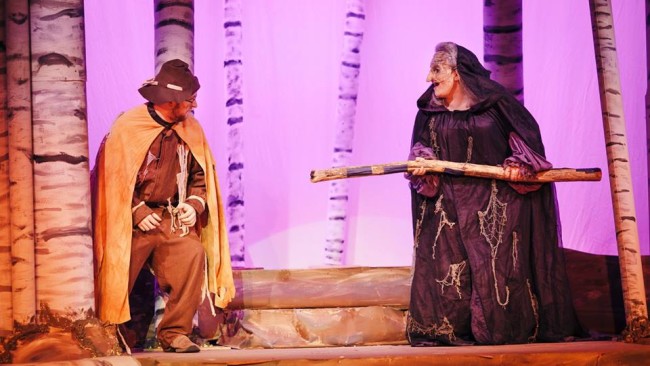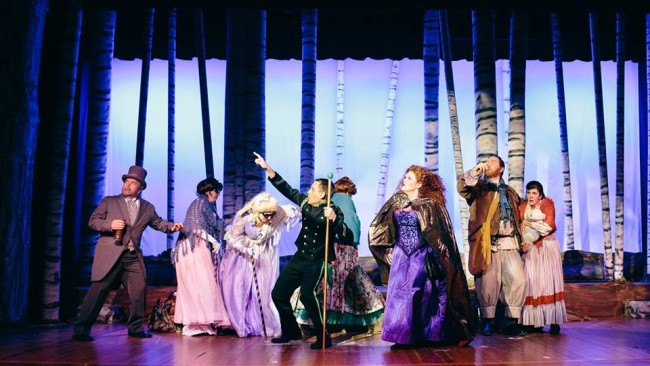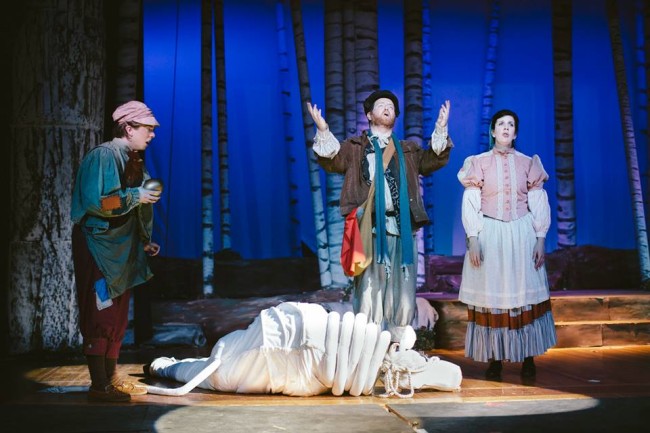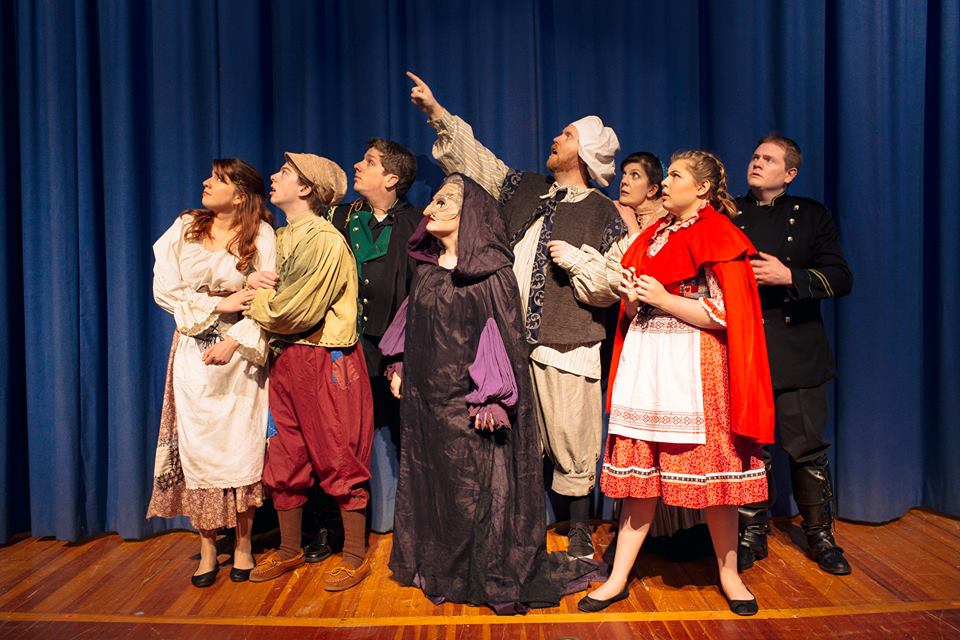This is just a moment in the woods! Again, please. Every theatre wants to take a stab at Sondheim, and the Reisterstown Theatre Project is no different. TheatreBloom takes that moment in the woods to sit down with Director Eric Besbris to uncover his vision behind the current RTP production of Into the Woods.
If you want to tell us who you are and what of your work people might recognize, we’ll get our “moment in the woods” underway.

Eric Besbris: I’m Eric Besbris and I’m currently directing Into the Woods for Reisterstown Theatre Project. This is the first time I’ve directed with RTP. I have directed before. I’ve directed for a company called Theatre Without Limits. They’re actually summer-only. They do a camp every year. Their first show out the gate was Snoopy: The Musical. I’m very friendly with the Artistic Director, there was a conversation which ended with me agreeing to come on for that show. I didn’t know the show but I learned it. I think it’s supposed to be a cast of eight people, we added a couple so we had a cast of ten in a small space and we just kind of put it together. A couple of the same people from that show are actually in this production, not by design or anything it just sort of happened. I’ve also directed with Liberty Showcase. Mostly kids musicals like Wonderland and Enchanted Sleeping Beauty. They’re lesser known published musicals for kids, nothing that’s run on Broadway. They’re designed for a lot of kids and a few adults but we made them a lot of fun. I wouldn’t say I have a ton of directorial experience. But this is definitely my biggest project I’ve undertaken and I’m pretty excited about it.
So what made you decide you wanted to come out and tackle Directing Into the Woods?
Eric: Okay, so number one, the company was completely cool with my vision of keeping the cast size as it was meant to be. I didn’t want to pack 60 people into the production, people are not going to be trees in the woods. I don’t treat actors like that. I didn’t just want to add unnecessary people. And actually it was really difficult because I was torn between wanting to audition to be in the show and wanting to submit to direct it. I would have wanted to have gone out for the Baker if I hadn’t submitted to direct.
You and Ryan Geiger could duke it out for who gets to be The Baker.
Eric: It’s so funny you say that as Ryan and I have duked it out in auditions for parts before. It’s pretty split when it comes down to who wins. I wanted to do Songs For a New World at Heritage Players many years ago, and he won that role. But we’re pretty well matched he and I, so I’m really happy to have him in the cast. But getting back to the original question, this show— Into the Woods— was the first Sondheim musical that I’d ever performed in. I played Rapunzel’s Prince. That was with Liberty Showcase eons ago, maybe 1994 or 1995. What’s very interesting is that Barbara (actress Barbara Hartzell, currently playing Baker’s Wife) played The Baker’s Wife in that same production with me.
Anyway, I put in my application to direct this one because this is something I’m passionate about. If I’m going to put in everything that it takes to direct a show, make it work and be the best that it can be, it has to be something that I’m really passionate about, and with this show I definitely am. These characters are relatable and I think Sondheim’s themes are always going to be valid. Times may have changed but the messages inside these stories are still important and relevant. Where these characters go, the journey they take— and you think you’re just watching a fairytale— the stories are so important. These character’s stories, the beautiful music, and then the amazing voices you put on top of that, that’s why I wanted to direct this show.
What has been one of the most exciting parts about getting to direct this show?
Eric: I think the talent that turned out at auditions. We had them really early, like back in November and a lot of people turned up, now we lost some people here and there as people were cast in other things, but it’s been great working with the people I have. It’s community theatre, and for community theatre doing Sondheim, fortunately I got— I said I there, I should say we. We, being RTP, we got great talent to come out for the show. It’s actually a very nice mix. We got a great experienced community theatre cast as well as a lot of new people to the group. There are a couple of young people who are getting to do their first leads as well. There’s something that— I wouldn’t call them the underdogs per se— but for me, with this show, people can sound as great as they want and be as perfect as they want, but I like when you can add a little roughness around the edges. It makes those characters a little bit grittier and a little bit more believable. I just love the mix of people that we have and all the talent that we have and how they’ve come together.
What has been the biggest challenge about taking on a massive-sized Sondheim musical in a community theatre with a community budget?
Eric: Great question. For any community theatre I think the answer to that question is always having enough people behind you to help you do the work. For as well as it’s all turned out and as put-together as we tried to be, we still had a ton of mishaps all along the way. One of our two Co-Music Directors had to go out for surgery in the middle of rehearsal. And she’s fine now, back and playing as the accompanist, but she missed four to six weeks of rehearsal. We had a Technical Director who was going to do the whole show that had a health emergency, resulting in a Producer that had to pick up all of those pieces. We’ve gotten through all of it. And the company has been very supportive in all of the other aspects that go along with getting a show up on its feet when you’re not having all of those emergencies and mishaps, like money needed, staying true to the vision, etc. The support I’ve gotten from the company is great.

My other biggest challenge was the act of balancing time. I have so many theatre veterans here in this production and as I’m sure you’ve heard and know, it is very easy to waste people’s time in community theatre. I felt, and still feel, an obligation to not do that and to make the rehearsals very useful. I felt that we’ve done that, I’ve done the best that I could. I had that sense of responsibility to make sure everyone was getting the most out of these rehearsals because I’ve been on the other side of it. You get called to rehearsal, you sit around when you’re supposed to be used and they just end up not getting to use you because of poor planning or something along those lines. I wanted to make sure that we didn’t do that while still staying true to getting the vision up on its feet in the time we had.
Oh and the third challenge! So in order to be inclusive of everyone who wanted to audition, and to be considerate of the audience and the demographic of the area we had some let’s call it scheduling difficulty. Easter and Passover are screwed up this year. They usually fall together or really close? But nope, not this year. We couldn’t open the weekend we wanted to open because that fell over Easter spring break which meant we wouldn’t have access to the school for what would have been our tech week. And so we’re opening on April 8th, and it’s a short two weekend run because the following weekend is Passover. That’s a horrific and unexpected hurdle to hear as a director when you’re planning dates for opening. “So you can open that weekend, but you won’t be able to be in the space the entire week leading up to your opening.” That becomes one of those “Oh my God, WHAT?” moments. And at that point you no longer have a choice about when you think you’re opening because you do not open a show where you cannot access the space the entire week before hand.
You keep talking about this vision but have yet to explain what exactly it is you’re envisioning. Now might be the time to elaborate on that.
Eric: Oh boy. Oy vey. Okay here we go. Everybody wants to reinvent Sondheim. But not me. Definitely a no for that. In fact, I wanted something simple for the set design, that’s how basic and true to the original I’m trying to keep it. I wanted a few movements here and there for the scene changes, but ultimately something where it would just run smoothly. I can’t deal with long scene changes. Especially in a show that has a real flow to it like this show does. If I’m having to stop and add five seconds to something or seven seconds to something to shift a scene around— and you know that seven seconds on stage feels like seven minutes to the audience— there’s a problem. That’s just a general practice of mine for all shows, not just Sondheim but especially for this one, scene changes deadly.
For this show, like I said, I wanted to keep it simple. There is a woods. You will see a woods it’s built up with platforms to create levels. And then there’s a cyc (cyclorama— a large curtain or wall often positioned at the back of the stage to enclose the stage and create a background) that we’re spreading on the stage, well we will be once we put it together because it’s not there in the school, but this lets us do a lot of interesting things with lighting effects. I want to highlight the characters, their emotions, and their stories. The focus should be on them and not on really crazy sets. The other thing that I always wanted to do with this show is build out the stage and put the orchestra off to the side. Now that’s a challenge and we’re working on it, but in doing this it brings the cast forward and even closer to the audience for a lot of their solo songs. This is a personal story for so many people involved so when we can get them closer to the audience, we do and this lets the audience really see all the emotions they’re experiencing.

I just— can’t say it enough. Simpler and focusing on the characters and their stories. I didn’t try to turn a concept, I didn’t take them out of the woods or modernize it to officially say “hey we’re here in 2016 in the ghetto somewhere.” This show doesn’t need that. I love the original production with Bernadette Peters. And you’re not trying to copy— and I don’t just mean everything they did in that original production— but with all the productions and variations that have come forth since, revivals, the movies, etc. But when things work? Like they did in that original production? They work for a reason, no need to redo them. Now you put your own twist on characters and things, but the overall concept worked the first time so there’s no need to change it all around into something unrecognizable.
Is there a moment in the show that speaks to you or defines the show for you?
Eric: Hmm. There are so many. Not to take away from others but as it turns out, after watching the show over and over, I think that moment for me is “No One is Alone.” I think the themes in that song and how the older characters— Cinderella and The Baker— what they’ve gone through and how they use that to comfort these younger characters— Jack and Red— what they’re realizing as they are comforting these children and saying “no one is alone” is that this is also true for themselves. That this comfort is not just for the children but for themselves. They’re singing about what they’ve been through to try and show the kids that it’ll be okay, but in doing that they realize that the message is meant for them too. It’s universal and really beautiful. Personally, the lyrics, the music, and the closure that all comes together in that moment just gives me goosebumps. Then of course there’s the end when The Baker is singing and The Baker’s Wife filters in and he’s hearing her giving him that advice, that part always gets me too. It’s just so well written. The whole show is so well written but those two moments in particular I think are the most well written.
Do you have a favorite fairytale?
Eric: That’s a really good question. I don’t know. I don’t want to just pick one to pick one, you know? I mean I like Cinderella. I like Snow White and the Seven Dwarves. I loved both of those cartoons. I don’t know that either one of them are my favorite. I don’t think I have a favorite. Oh maybe that’s why Into the Woods really appeals to me because you don’t have to have a favorite, they’re all here. The way those stories are all woven together in this show, the way these fairytales all fit into each other’s lives, it’s just so well done.
What has taking on this project taught you about yourself?
Eric: Oh my gosh. That’s a great question! A lot of things. I’m trying to find a way to articulate them. I think I alluded to this a little bit before, about being passionate about a project. I have to have that passion for it because if I put the time in, which is all-encompassing, I want it to be worth it. I mean I’m up at one or two in the morning making notes and figuring out ways to fix things or try new things. And I think I really have to have that passion going so that I can let go of certain things that I know I can’t do. I don’t know how to build a set, I’m not a good painter, I’m not a costumer. So having people that you trust, that you feel really get your vision— vision is an overused word, I think— having people that support my ideas, that is so important here. And having that has really reminded me and retaught me that I’m an “all-in” guy. Being fully committed to this is very important to me.

It’s not paid but it’s a job to me. It is fun— we do this for fun— but I take it as seriously as if it were a job, I don’t want people mistaking that for the drudgery that people think of when they think of the word job. I want to give my all and not just for me. Not only do I want to feel like I’ve given it everything I could to get the best possible result out of it, but I want everybody else who is bringing that same level of passion and dedication and commitment, for everyone else who is putting their time in, I want them all to be proud of what they’ve invested in. So maybe I didn’t actually learn that about myself so much as it was reinforced in my mind. I learned that I could have much more patience than I thought I could have.
Why do you want people to come out and see this production?
Eric: Well because I love the show. The music is fantastic. These performers are excellent. They’ve spent so much time and have put so much into these roles that they deserve an audience. For their talent, for their effort, for their ability, for all their hard and committed work, they deserve an audience. We worked through all that snow in January, we made it through Snowpocalypse pretty much on schedule. The snow didn’t kill us and we stayed on target. This whole cast and crew and company has just worked so hard. They need people to see how hard they’ve worked. I hope it goes well, this is the biggest show I’ve done, and I’m hoping that it’s well received in case I decide I’d ever like to direct again. There’s no reason that it shouldn’t be, but I want to put the good vibes out there.
Into The Woods plays through April 17, 2016 at Reisterstown Theatre Project in residence at Franklin Middle School— 10 Cockeys Mill Road in Reisterstown, MD. Tickets are available for purchase at the door (cash or check only) or in advance online.
To read the interview with actress Kristen Zwobot, click here.

